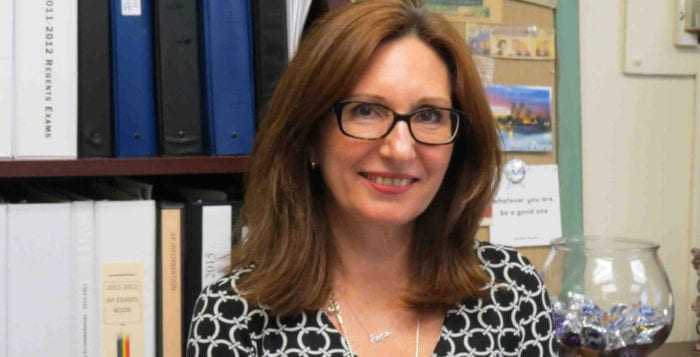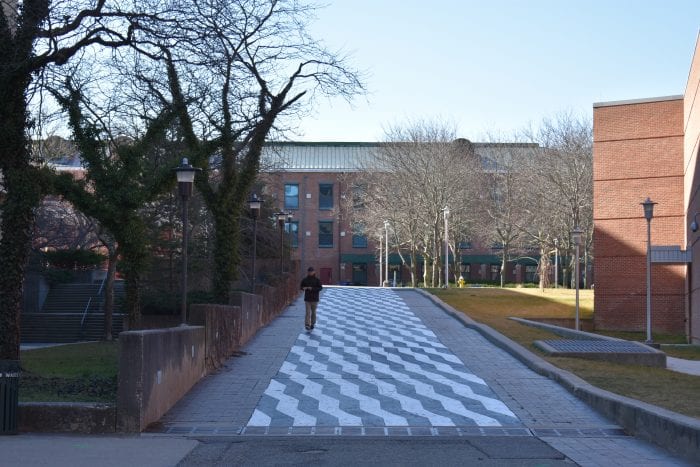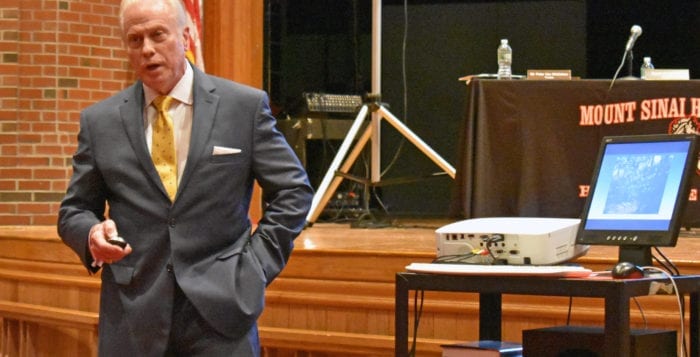Gov. Andrew Cuomo (D) gave the green light for schools to reopen come September.
“You look at the infection rate — we are probably in the best situation in the country,” Cuomo said during a media call Friday.
The governor recommended that school districts offer community discussion to find common ground for families and teachers.
Like many school districts in New York state, Smithtown township schools submitted their recommended reopening plans by July 31 but each offers a different plan for educating their students.
Smithtown Central School District
Smithtown decided on a hybrid model where half of the students will attend school in-person Mondays and Tuesdays and the other half will attend Thursdays and Fridays. Students will alternate attending classes on Wednesdays. The school will also offer remote learning with both real-time and recorded instruction for those who are unable to attend school in person or whose families chose not to send them during the pandemic.
In the FAQ section of the Smithtown district webpage, administrators said they chose not to have classes in person five days a week due to New York State Education Department guidance that requires schools to enforce social distancing of 6 feet apart in all school facilities, on school grounds and during transportation.
“We have a fundamental concern that, given the nature of schools, as well as the ages of the students we serve, the district felt that operating at full capacity would unnecessarily compromise the health and safety of our students and staff,” the district wrote.
Upon news of the recommendation of a hybrid model some parents reached out to the district to ask why the closed Nesconset and Branch Brook elementary schools couldn’t be opened to enable the social distancing required. The families also started the Open Up Branch Brook & Nesconset El!!!! Facebook group, which has more than 1,500 members, and protested in front of the New York Avenue administration building Aug. 5 and Aug. 11.
According to the school’s FAQ section, class sizes will be reduced by about 50 percent. That would still leave 1,600 students to be placed in the two buildings and social distancing would still not be possible. Currently enrollment in the seven open elementary schools is between 370 and 550 students each. The district added that an additional 170 teachers and other staff members would have to be hired if the two buildings were to open.
“The currently vacant buildings would also require multiple infrastructure, technology and security upgrades that would be needed to meet state requirements prior to approval for use by the NYSED.” the district said.
Families were sent a survey earlier in the summer to gauge interest in remote instruction and to find the feasibility of students returning full time. Survey results of elementary school families displayed at the end of July showed 19.5% said “yes” to full time remote learning even if school was full time and 13.9% said they would choose full time remote even if school was hybrid. More than half, 59.1% said they would have their child ride the bus. In another survey the results were 20%, 14.5% and 58.7%, respectively as of Aug. 6. Surveys were of an unknown sample size.
Students and employees will be asked to wear facial coverings on the bus, upon entry and exit of school buildings, common spaces and whenever students and staff cannot maintain proper social distancing. Due to desks being spaced out, students will be able to remove masks during classroom time, but they are encouraged to wear them at all other times. It is also recommended that students eat in classrooms to minimize the movement of people through the hallways, and 12 feet will be maintained between participants when engaging in physical activity, singing or playing wind instruments.
In an Aug. 10 letter to families, Russell Stewart, interim superintendent of schools, said the district was investigating if the reopening plan needed to be updated with additional details regarding remote learning, contact tracing and student and staff testing. The district has scheduled three additional board of education online meetings to provide public sessions for parents. The meetings are scheduled for Aug. 17, 19 and 21.
The district said students in the Extended School Year Program for Special Education students started the summer with a fully remote program and then transitioned to a hybrid model, which the district said worked well.
Kings Park Central School District
Even before students step out of their houses in Kings Park, every day during the week parents will be required to fill out an online student health self-screening form, which will require a temperature check and answers to questions such as if the child was exposed to a person with COVID-19 and if they have certain symptoms, including cough, fever and sore throat.
Parents submitted questions about the reopening plans, and they were published on Kings Park district’s website along with answers from the district. When asked why there weren’t temperature stations at the buildings, the district said taking every student’s temperature upon arrival is nearly impossible and would impact school start time.
“We need to remember that, while fever or chills (100 degrees or greater) is one of the top symptoms along with cough, shortness of breath and fatigue), current research on COVID-19 has shown that less than 50% of school-age students present with a temperature,” the statement read on the district’s website.
While it is encouraged for parents to drive their children to school, buses will still be available and students where both drivers will be required to wear masks.
The district has divided the recommended reopening plans into four models labeled green (safe), yellow (low risk), orange (moderate risk) and red (high risk).
While green means schools can reopen with five day in-person classes and no restrictions, the reopening plan said the scenario is unlikely until the pandemic is over or a vaccine is available to the general public.
The district’s yellow plan includes in-person class with restrictions, such as masks, social distancing and modifications to the day, including arrival and dismissal times, lunch, physical education and more. The orange plan, which the district will use for at least the first two weeks, will be a hybrid model to reduce building capacity by 50%. Students will be split up into two groups, where group A will go to school Monday and Thursday and the other, group B, will attend school Tuesday and Friday. On the other days, students will participate in remote learning, and buildings will be disinfected Wednesdays and Saturdays.
A remote option will be provided for students who are medically vulnerable or live with someone who is, and if the school’s must close buildings again, remote learning, the red plan, will be offered with both recorded and live instruction. English language learners and those who are in special needs classes will attend class in person every day.
According to the district’s Q&A section on reopening, students will be required to wear masks all day except when eating and during mask breaks. Alternate areas including classrooms, gymnasiums and outdoor spaces will be considered to spread out students during lunch.
Commack Union Free School District
While elementary school students will attend school every day in person, secondary students will be in buildings every other day. The recommended plan depended on the district resolving transportation issues, which according to the Commack schools’ website, was accomplished recently.
The district offered families to opt out of transportation for the upcoming school year. The number of riders needed to be reduced was 50% to allow all elementary students to attend school daily, according to the district’s reopening plans.
“The Commack School District is committed to bringing all elementary students back into their school buildings this fall,” the plan read. “Therefore, it is necessary to reduce the number of elementary school riders by 50%. If we fail to reduce our elementary ridership by 50%, elementary students will not be able to attend ‘brick and mortar school’ daily, and students would attend every other day engaging in remote learning on the days they are not in a school building.”
Currently, buses that usually seat 64 can only transport 22 to allow for social distancing.
Elementary school students in Commack will be divided into groups A and B, with A taking core classes in the morning and then lunch and gym, art and other enrichment classes in the afternoon. The B group’s schedule will be the opposite.
High school and middle school students will have capacity in the building reduced to 50% and students will attend schools on alternating days. There is also a plan for teachers to change classrooms instead of students to minimize traffic in hallways. An every other day school schedule will be applied where the A group will attend school Monday, Wednesday and Friday on the first week and Tuesday and Thursday the next week. Students in the B group will attend Tuesday and Thursday the first week and Monday, Wednesday and Friday the second week.
Students will be required to wear masks when not seated at their desks and every desk will have a plastic sneeze guard. According to the district’s Q&A on its website, parents and guardians are encouraged to take children’s temperatures at home and will complete an attestation on a COVID app confirming that their child does not have a temperature above 100 degrees. Students’ temperatures will also be taken upon arrival at school with a temperature scanner.




























